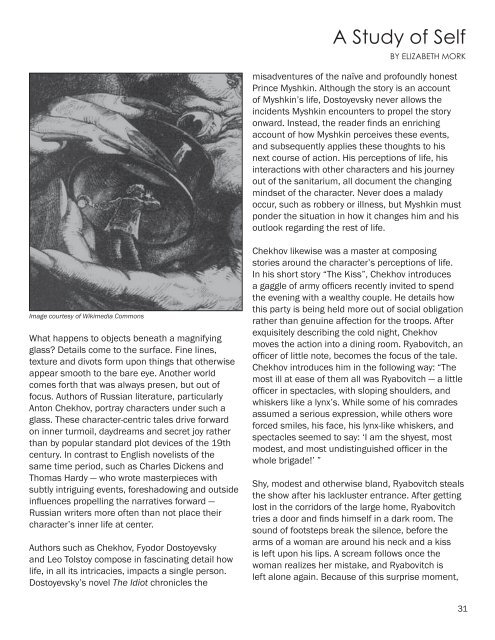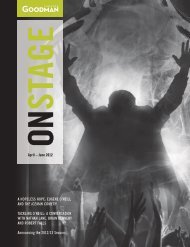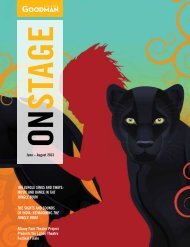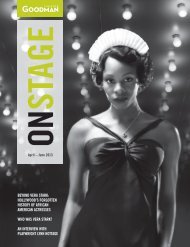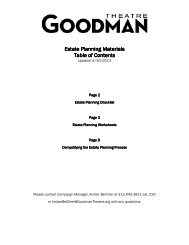The Seagull Study Guide (12MB) - Goodman Theatre
The Seagull Study Guide (12MB) - Goodman Theatre
The Seagull Study Guide (12MB) - Goodman Theatre
You also want an ePaper? Increase the reach of your titles
YUMPU automatically turns print PDFs into web optimized ePapers that Google loves.
A <strong>Study</strong> of Self<br />
BY ELIZABETH MORK<br />
misadventures of the naïve and profoundly honest<br />
Prince Myshkin. Although the story is an account<br />
of Myshkin’s life, Dostoyevsky never allows the<br />
incidents Myshkin encounters to propel the story<br />
onward. Instead, the reader finds an enriching<br />
account of how Myshkin perceives these events,<br />
and subsequently applies these thoughts to his<br />
next course of action. His perceptions of life, his<br />
interactions with other characters and his journey<br />
out of the sanitarium, all document the changing<br />
mindset of the character. Never does a malady<br />
occur, such as robbery or illness, but Myshkin must<br />
ponder the situation in how it changes him and his<br />
outlook regarding the rest of life.<br />
Image courtesy of Wikimedia Commons<br />
What happens to objects beneath a magnifying<br />
glass? Details come to the surface. Fine lines,<br />
texture and divots form upon things that otherwise<br />
appear smooth to the bare eye. Another world<br />
comes forth that was always presen, but out of<br />
focus. Authors of Russian literature, particularly<br />
Anton Chekhov, portray characters under such a<br />
glass. <strong>The</strong>se character-centric tales drive forward<br />
on inner turmoil, daydreams and secret joy rather<br />
than by popular standard plot devices of the 19th<br />
century. In contrast to English novelists of the<br />
same time period, such as Charles Dickens and<br />
Thomas Hardy — who wrote masterpieces with<br />
subtly intriguing events, foreshadowing and outside<br />
influences propelling the narratives forward —<br />
Russian writers more often than not place their<br />
character’s inner life at center.<br />
Authors such as Chekhov, Fyodor Dostoyevsky<br />
and Leo Tolstoy compose in fascinating detail how<br />
life, in all its intricacies, impacts a single person.<br />
Dostoyevsky’s novel <strong>The</strong> Idiot chronicles the<br />
Chekhov likewise was a master at composing<br />
stories around the character’s perceptions of life.<br />
In his short story “<strong>The</strong> Kiss”, Chekhov introduces<br />
a gaggle of army officers recently invited to spend<br />
the evening with a wealthy couple. He details how<br />
this party is being held more out of social obligation<br />
rather than genuine affection for the troops. After<br />
exquisitely describing the cold night, Chekhov<br />
moves the action into a dining room. Ryabovitch, an<br />
officer of little note, becomes the focus of the tale.<br />
Chekhov introduces him in the following way: “<strong>The</strong><br />
most ill at ease of them all was Ryabovitch — a little<br />
officer in spectacles, with sloping shoulders, and<br />
whiskers like a lynx’s. While some of his comrades<br />
assumed a serious expression, while others wore<br />
forced smiles, his face, his lynx-like whiskers, and<br />
spectacles seemed to say: ‘I am the shyest, most<br />
modest, and most undistinguished officer in the<br />
whole brigade!’ ”<br />
Shy, modest and otherwise bland, Ryabovitch steals<br />
the show after his lackluster entrance. After getting<br />
lost in the corridors of the large home, Ryabovitch<br />
tries a door and finds himself in a dark room. <strong>The</strong><br />
sound of footsteps break the silence, before the<br />
arms of a woman are around his neck and a kiss<br />
is left upon his lips. A scream follows once the<br />
woman realizes her mistake, and Ryabovitch is<br />
left alone again. Because of this surprise moment,<br />
31


